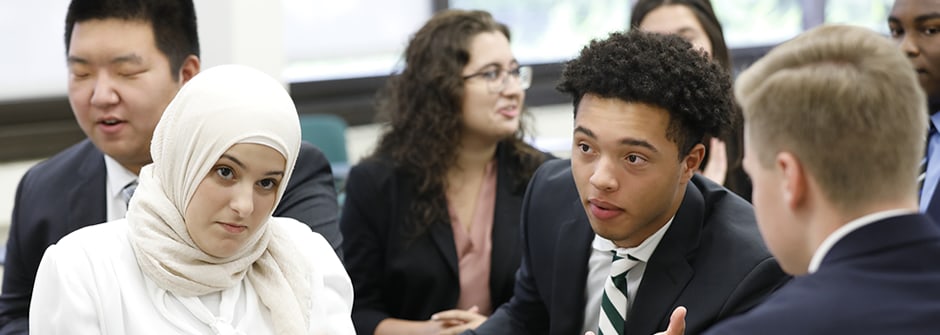
About the Buccino Leadership Institute
A Four-Year Journey
The Buccino Leadership Institute’s curriculum spans each student’s college career, giving them a competitive edge after graduation.
- Year 1: Leading Yourself
- Year 2: Leading Others
- Year 3: Experiential Learning Pathways
- Year 4: Leading in the Institute
An Interdisciplinary Experience
One of the unique aspects of the Buccino Leadership Institute is that we’re interdisciplinary. While most collegiate leadership programs reside only in the business school, we believe it’s important to grow leaders in all disciplines and industries. To do this, we come together once a week to learn about leadership through an interdisciplinary lens.
Using an interdisciplinary approach, students not only learn about the universal truths as they pertain to leadership, but they’re exposed to the challenges facing leaders in other fields and how they’ve overcome them. This makes students better equipped to lead themselves and others after they graduate, no matter what profession they choose.
Learning by Doing
At the Buccino Leadership Institute, we believe in experiential learning. You don’t become an excellent driver by only studying the driver’s manual. You have to get out there and drive. To become a great leader, you have to practice leading. You have to experience leadership. Throughout your four years, you will have numerous opportunities to lead and to get feedback on how to lead more effectively.
Interdisciplinary Team Projects
One of the ways that we give students experiential learning in leadership is through our Interdisciplinary Team (IDT) projects. These are semester-long projects that take place in the Spring semester of your freshman year. They are completely student-run. IDTs are comprised of small groups of students representing different majors, and 1-2 upperclassman mentors.
In these IDTs, students pick the project. Students select their leader. Students make mistakes and learn from those mistakes. Students present the results of their project to university and community leaders. In other words, students learn how to lead.
Students are invited to turn their project proposals into initiatives of the Institute in their upperclassmen years. For example, one team took their idea and turned it into a business, winning over $5,000 in a competition for young entrepreneurs.
Ideas and Trends
Sophomores complete a large group project within their LEAD class. Each group is assigned a future forward project topic (e.g. digital twins, robotics, smart wearables), a set of deliverables (e.g. a video, presentation, and blog), and upperclassmen mentors. The project is purposely unstructured otherwise with the objective of learning the critical skill of leading through ambiguity and uncertainty.
In the end half of the spring semester, students will present their project to their peers as well as a panel of external judges. Top projects will be selected to present their project to external guests including advisory council members, University leadership, etc.
Experiential Learning Pathways
Projects choose a pathway based on their interests and professional development needs, including mentorship - developing a teaching or facilitation experience; leadership development research (guided by a faculty member) or developing a leadership case study; or a community impact project, either for the University or consulting for an external organization. Students will utilize Issue Based Problem Solving and develop a business case for their project.
Experiential Learning Pathways projects are designed to benefit each junior’s personal and professional goals and allow them to exercise and expand the leadership skills they have learned from the Institute. ELP projects provide students a strong example of their professionalism and leadership skills and capabilities to be used in their portfolio/resume/cover letter/interview and will be able to impress their future career interviewers with the outcomes.
Project teams engage external mentors to gain valuable insights into their project area, professional development and leadership development. Mentors include Seton Hall professors or administrators and external community members. The mentorship relationship is a networking opportunity for participants.
In the end half of the spring semester, students present their project to the Institute and mentors. Top projects are selected to present their project to external guests including advisory council members, University leadership, etc.
Student-Led Initiatives
Beyond the IDTs in the freshman and sophomore years, students can participate in and lead the following Institute-wide initiatives.
- Seton Hall Undergraduate Leaders Podcast – we produce a podcast featuring leaders from a variety of industries. We have students who direct, engineer, select guests, interview, research, market, and distribute this podcast.
- Student Council – students represent their peers in this body designed to improve all aspects of the Institute and the student leadership experience.
- Strategic Communications – a team of interdisciplinary students collects, edits, and publishes content for our website and social media platforms (Instagram and LinkedIn).
-
Pirate Planners – students propose and plan field trips for the Institute, including a popular trip to Washington, D.C.
Feedback
Feedback is a defining feature of our program. Throughout your four years in the Institute, you will receive constructive feedback from a variety of sources that is designed to make you a more effective leader. You’ll receive feedback from the Executive Director, your peers and even your own personal, professional leadership coach.
You’ll also take the leading professional assessments in the field (e.g. Eqi-2.0 emotional intelligence assessment, DISC behavioral assessment, and the Strengths Finder assessment) to make you more self-aware of your strengths and weaknesses.

